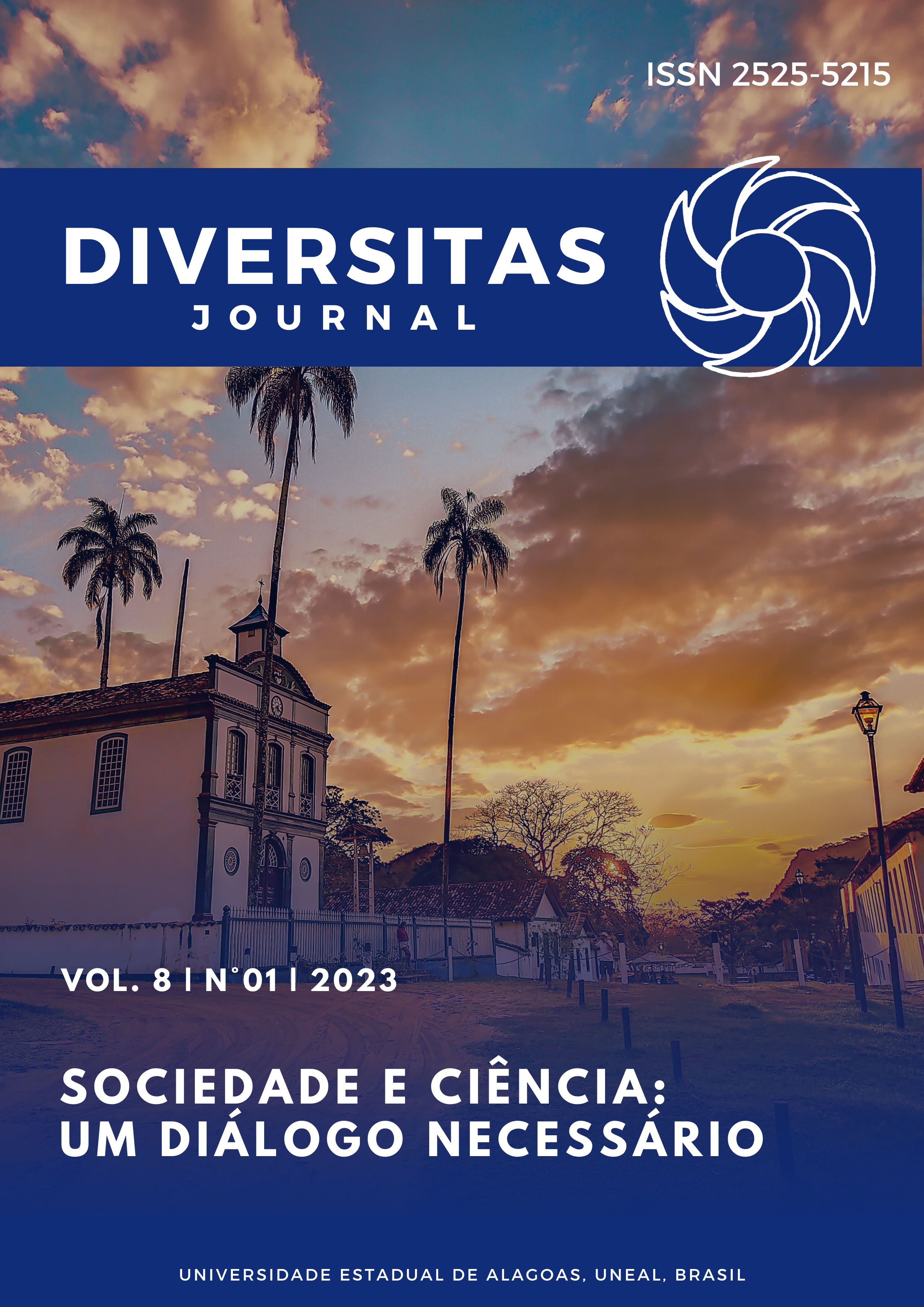The Relevance of the Supervised Curricular Internship in Teacher Training
DOI:
https://doi.org/10.48017/dj.v8i1.2340Keywords:
Contributions, Skills, Teaching PracticeAbstract
It is during the supervised curricular internship that the future teacher will acquire the pedagogical knowledge, as well as the necessary skills to adequately face the teaching career. Based on this principle, the objective of this work is to highlight the importance of supervised curricular internship, as well as its contributions to teacher training. The research was developed through a bibliographic review of articles indexed in the databases of scielo, Google Scholar and Capes Periodicals Portal, about the “Importance of the Supervised Curricular Internship in Teacher Training”. The supervised internship has great relevance as an instrument of union between university, school and community, giving a great opportunity for growth during teacher training, showing how important it is, where it is one of the most significant moments of undergraduate courses. One of the major concerns in teacher education is the transition from academic knowledge to professional knowledge. And the internship is a fundamental moment that will condition their future professional practice in the professional training of teachers, as they live a unique experience of training and monitoring. Undergraduates create perspectives on the experience, since after having focused on theoretical knowledge, it is time to implement everything that was discussed during the training course, taking theory to practice. In this way, the internship is very important, as it is one of the most significant moments of undergraduate courses.
Metrics
References
Andrade, A. M. de. (2005). O Estágio Supervisionado e a Práxis Docente. In: Silva, M. L. S. F. da. (Org.). Estágio Curricular: Contribuições para o Redimensionamento de sua Prática. Natal: EdUFRN,
Barreiro, I. M. de F., & Gebran, R. A. (2006). Prática de ensino: elemento articulador da formação do professor. São Paulo: Avercamp.
Bernardy, K., & Paz, D. M. T. (2012). Importância do estágio supervisionado para a formação de professores. XVII Seminário Interinstitucional de ensino, pesquisa e extensão. Anais: Unicruz, 1-4.
Benites, L. C., Souza Neto, S. D., & Hunger, D. (2008). O processo de constituição histórica das diretrizes curriculares na formação de professores de Educação Física. Educação e Pesquisa, 34, 343-360.
Bianchi, A. C. M., Alvarenga, M., & Bianchi, R. M. (2005). Orientações para o Estágio em Licenciatura. São Paulo: Pioneira Thomson Learning.
Brasil. (1996). Lei de Diretrizes e Bases da Educação Nacional. Brasília. Disponível em
http://portal.mec.gov.br/arquivos/pdf/Idb.pdf.
Cabral, V. L. A., & Angelo, C. B. (2010). Reflexões sobre a importância do estágio supervisionado na prática docente. VI EPBEM–Monteiro, PB–09, 10.
Cardoso, E. A. M., Silva, L. A., & dos Santos, A. R. (2018). Formação, currículo e prática pedagógica: desafios na contemporaneidade. Linguagens, Educação e Sociedade, 1(1), 3-22.
Fernandes, C. (2021). Procedimentos para uma intervenção pedagógica na perspectiva discursiva. Revista Linguagem & Ensino, 24(3), 398-421.
Filho, A. P. O. (2010). Estágio Supervisionado e sua importância na formação docente. Revista P@rtes. Disponível em http://www.partes.com.br/educacao/estagiosupervisionado.asp.
Francisco, C. M., & Pereira, A.S. (2004). Supervisão e Sucesso do desempenho do aluno no estágio. Revista Digital. Buenos Aires, Ano 10, nº 69. Disponível em http://www.efdeportes.com/efd69/aluno.htm>.
Freire, P. (2002). Educação como prática da liberdade. Rio de Janeiro: editora.
Januario, G. O. ( 2008). Estágio Supervisionado e suas contribuições para a prática pedagógica do professor. In: seminário de história e investigações de/em aulas de matemática, 2. Campinas. Anais: II SHIAM. Campinas: GdS/FE-Unicamp, v. único. p. 1-8.
Linhares, P. C. A., da Silva Irineu, T. H., da Silva, J. N., de Figueredo, J. P., & de Sousa, T. P. (2014). A importância da escola, aluno, estágio supervisionado e todo o processo educacional na formação inicial do professor. Revista Terceiro Incluído, 4(2), 115-127.
Martin, A. I. M. (2011). A observação no estágio pedagógico dos professores de Educação Física. Disponível em http://recil.grupolusofona.pt/bitstream/handle/10437/1581/Relat%C3%B3rio%20Est%C3%A1gio%20Ana%20Martins.pdf?sequence=1>.
Oliveira, E. da S. G. de., & Cunha, V. L. (2016). O estágio supervisionado na formação continuada docente a distância: desafios a vencer e construção de novas subjetividades. Revista de Educación a Distância. v. 5, n. 14, p. 1-18. Disponível em http://www.um.es/ead /red/14/oliveira. pdf
Pimenta, S. G. (1995). O estágio na formação de professores: Unidade entre
teoria e prática? Cad. Pesq. São Paulo, n94, p 58-74.
Pimenta, S. G. (1997). O estágio na formação de professores: unidade, teoria e prática. 3. ed. São Paulo: Cortez.
Pimenta, S. G., & Lima, M. S. L. (2004). Estágio e Docência. São Paulo: Cortez.
Santos, R., & Goi, M. E. J. (2017). O estágio na formação docente. Anais do Salão Internacional de Ensino, Pesquisa e Extensão, 9(1).
Silva, A. G. F. (2014). O Estágio Como Espaço De Formação Profissional0. Disponível em http://pinba.files.wordpress.com/2011/12/o-estc3a1gio-como-espac3a7o-de-formac3a7c3a3o-profissional.pdf>. Acesso em: 10 jul. 2021.
Sousa, M. D. S. C., de Sousa, F. C., de Sá, C. A. A., Santos, C. R. N., & de Melo Silva, L. M. (2014). A articulação do senso crítico na Formação Docente. Revista Verde de Agroecologia e Desenvolvimento Sustentável, 9(5), 1.
Tardif, M.; Lessard, C. (2008). O ofício de professor: história, perspectivas e desafios internacionais. 2. Ed. Petrópolis, RJ: Vozes.
Downloads
Published
How to Cite
Issue
Section
License
Copyright (c) 2022 Natanielle de Oliveira Gomes Leite

This work is licensed under a Creative Commons Attribution 4.0 International License.
The Diversitas Journal expresses that the articles are the sole responsibility of the Authors, who are familiar with Brazilian and international legislation.
Articles are peer-reviewed and care should be taken to warn of the possible incidence of plagiarism. However, plagiarism is an indisputable action by the authors.
The violation of copyright is a crime, provided for in article 184 of the Brazilian Penal Code: “Art. 184 Violating copyright and related rights: Penalty - detention, from 3 (three) months to 1 (one) year, or fine. § 1 If the violation consists of total or partial reproduction, for the purpose of direct or indirect profit, by any means or process, of intellectual work, interpretation, performance or phonogram, without the express authorization of the author, the performer, the producer , as the case may be, or whoever represents them: Penalty - imprisonment, from 2 (two) to 4 (four) years, and a fine. ”


















